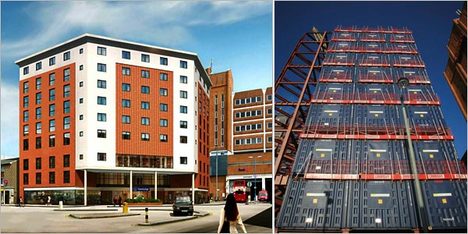
Source of image: http://mjperry.blogspot.com/2008/02/blog-post_2174.html
Stephen Moore is right when he calls Drew Carey’s “Living Large” video “wonderful.”
It would be even more wonderful, if it gave a bit more emphasis, a la Schumpeter, to the positive effects of new products, in addition to its emphasis on declining prices of already existing products.
(p. W11) A few weeks ago I gave a talk on the state of the economy to a group of college students — almost all Barack Obama enthusiasts — who were griping about how downright awful things are in America today. As they sipped their Starbucks lattes and adjusted their designer sunglasses, they recited their grievances: The country is awash in debt “that we will have to pay off”; the middle class in shrinking; the polar ice caps are melting; and college is too expensive.
I’ve been speaking to groups like this one for more than 20 years, but I have never confronted such universal pessimism from a young audience. Its members acted as if the hardships of modern life are making it nearly impossible for them to get out of bed in the morning. So I conducted a survey of these grim youngsters. How many of you, I asked, own a laptop? A cellphone? An iPod, a DVD player, a flat-screen digital TV? To every question somewhere between two-thirds and all of the hands in the room rose. But they didn’t even get my point. “Well, duh,” one of them scoffed, “who doesn’t have an iPod these days?” I was way too embarrassed to tell them that I, for one, don’t. They thought that living without these products would be like going back to prehistoric times.
They seemed clueless that as recently as the early 1980s only the richest people in the world had cellphones and the quality of these products left much to be desired. Watch a movie from 20 years ago and you will laugh out loud seeing big clunky black machines that weighed as much as a brick, gave crackly service and cost $4,200. Now cellphones are practically free — even disposable. And the cost of making calls has dropped dramatically too.
. . .
There’s a wonderful new video on Reason.tv called “Living Large.” In it, comedian Drew Carey goes to a lake in California where people are relaxing on $80,000 27-foot boats and goofing around on $25,000 jet skis that they have hitched to their $40,000 SUVs. Mr. Carey asks these boat owners what they do for a living. As it turns out, they aren’t hedge-fund managers. One is a gardener, another a truck driver, another an auto mechanic and another a cop.
. . .
After my lecture, one young woman walked up to me on her way out and huffed: “What I favor is a radical redistribution of wealth in America.” I tried to tell her that America’s greatness is a result of our focus on creating wealth, not redistributing it. But it was too late — she was already tuning in to her iPod.
For the full commentary, see:
STEPHEN MOORE. “DE GUSTIBUS; The Bare Necessities: A Generation Tries to Imagine Life Without iPods.” The Wall Street Journal (Fri., March 14, 2008): W11.
(Note: ellipses added.)
The video is:
Carey, Drew. “Living Large: The Middle Class.” reason.tv Posted February 8, 2008.






